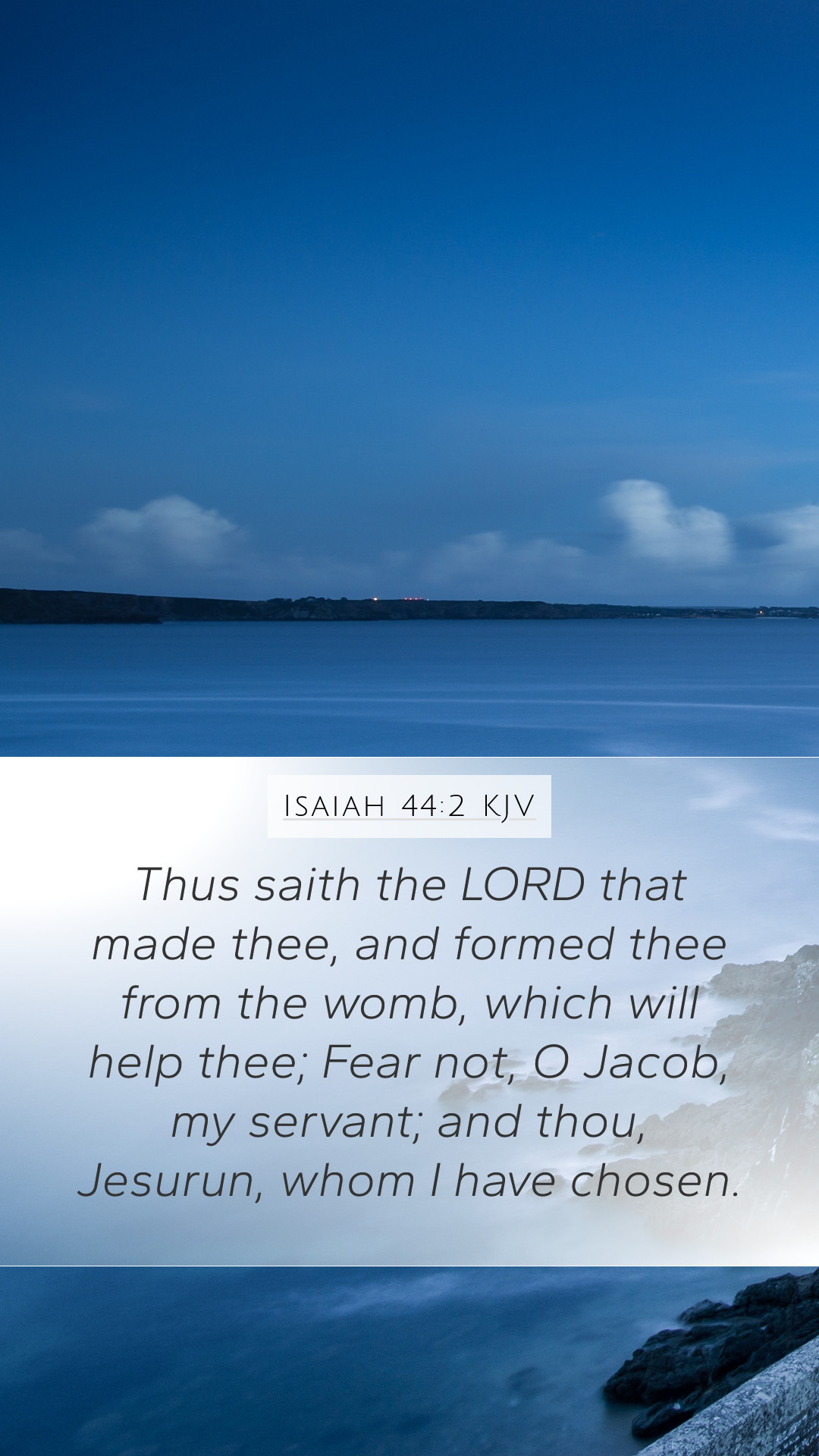Understanding Isaiah 44:2
Isaiah 44:2: "Thus says the Lord who made you, and formed you from the womb, who will help you: ‘Fear not, O Jacob My servant; and you, Jeshurun, whom I have chosen.'" This verse is rich in meaning, providing both reassurance and a clear declaration of God's relationship with His people. Below, we explore the various interpretations and meanings drawn from public domain commentaries by trusted theologians such as Matthew Henry, Albert Barnes, and Adam Clarke.
Bible Verse Meanings
This verse is a profound declaration of God's creative power and His protective nature. It emphasizes God's role as the Creator, who made and formed His people with care. Henry states that God’s calling of Jacob (Israel) is rooted in His intentional creation.
The Divine Maker
Creation and Formation: The mention of God as the one who "made" and "formed" emphasizes His sovereignty over creation (Isaiah 45:9). Adam Clarke elaborates that this highlights not just the physical creation but also a spiritual restoration. The phrase speaks to God’s personal involvement in the life of His people.
Reassurance to Jacob
Fear Not: God's command to "Fear not" reflects His desire to comfort His people amidst challenges. Albert Barnes details this reassurance, explaining that fear tends to arise from uncertainty or impending danger, but God dispels that fear through His promises of aid and support. Such commands to not fear echo throughout Scripture (Isaiah 41:10).
Chosen People
Jeshurun: This term, often used as a poetic reference to Israel, indicates the beloved status of God’s people. Matthew Henry emphasizes that it symbolizes the upright or righteous, highlighting their covenant relationship with God. The use of "My servant" illustrates God’s intention to use Israel for His purposes (Isaiah 41:8).
Biblical Exegesis
The context of Isaiah during a time of impending judgment and future hope is essential. This verse operates within a broader narrative of restoration. Adam Clarke points out that this declaration serves not just as reassurance but as a calling to return to faithfulness and trust in God’s promises.
- Historical Context: This message was directed to the Israelites who were facing exile and despair. The prophecy serves as a reminder of God's unfailing relationship with them, and Isaiah positions this assurance amidst a bleak future.
- Theological Implications: It reflects the nature of God as not only a creator but also a sustainer and helper, indicating a relational aspect of faith and dependence on God's provision.
Application of the Verse
Understanding this verse encourages individual believers and Bible study groups alike to ponder their own challenges and the assurances God provides. It invites inquiry into how this ancient text applies to modern faith journeys. Here are some applications drawn from commentaries:
- Personal Assurance: Believers can find comfort in their identity as created beings with intrinsic worth, reflecting often on God's role as their helper.
- Covenant Faithfulness: The reminder of being chosen encourages communal reflection on God’s faithfulness and the importance of remaining steadfast in faith.
- God’s Promises: Reflecting on the specificity of God's help invites followers to explore personal testimonies of faith and reliance on His promises in various life circumstances.
Further Biblical References
This verse resonates with several other passages that convey similar themes of divine assistance and the significance of God’s involvement in the lives of His people:
- Isaiah 41:10 - "Fear not, for I am with you." This verse reiterates God's promise of presence and support.
- Isaiah 43:1 - "Fear not, for I have redeemed you." Highlights God’s redemptive acts toward His people.
- Jeremiah 1:5 - "Before I formed you in the womb, I knew you." Related to God's intentional formation and purpose for individuals.
Conclusion
In summary, Isaiah 44:2 offers a compelling blend of reassurance and divine truth, affirming God's role as the Creator and Provider while calling His people to trust and not fear. The meaning of this Bible verse unfolds in layers, revealing deep theological insights and practical applications for Bible study. Engaging with such texts can enrich one’s understanding of Scripture and enhance personal faith.


